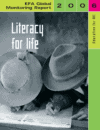This fourth edition of the EFA Global Monitoring Report focuses on literacy, one of the most neglected of the six goals adopted in 2000 by 164 countries at the World Education Forum in Dakar (Senegal). The Report stresses the urgency of devoting increased policy attention and resources to literacy, emphasising the profound benefits it confers on individuals, communities and nations (Chapter 5). Literacy skills are essential in today’s knowledge societies. Understandings of literacy have evolved over the past fifty years to reflect these increasingly complex and demanding needs (Chapter 6). Drawing on a range of data sources, the Report analyses the scale of the literacy challenge (Chapter 7). A historical overview analyses how different societies have made the transition to widespread literacy, taking stock of the broader social context that motivates individuals to acquire and sustain their literacy skills (Chapter 8).
Building literate societies calls for a threefold strategy of quality schooling, youth and adult programmes and the promotion of literate environments (Chapter 9). This approach reflects the interconnected nature of the EFA goals, towards which the Report examines progress, notably the 2005 gender parity goal (Chapter 2). To accelerate the pace of change, sound national policies are required (Chapter 3).
The international community must support these efforts: although aid to basic education is on the rise, it remains far short of needs (Chapter 4). The Report concludes by highlighting priority measures for the EFA goals to be achieved in the next ten years (Chapter 10).
Please note: The analysis and policy recommendations of this Report (Literacy For Life) do not necessarily reflect the views of UNESCO. The Report is an independent publication commissioned by UNESCO on behalf of the international community. It is the product of a collaborative effort involving members of the Report Team and many other people, agencies, institutions and governments. Overall responsibility for the views and opinions expressed in the Report is taken by its Director.
The designations employed and the presentation of the material in this publication do not imply the expression of any opinion whatsoever on the part of UNESCO concerning the legal status of any country, territory, city or area, or of its authorities, or concerning the delimitation of its frontiers or boundaries.



Responses